Polling Published December 19, 2019 · 11 minute read
Strings Attached: Democratic Primary Voters Want Targeted Investment in Higher Ed
Tamara Hiler & Lanae Erickson
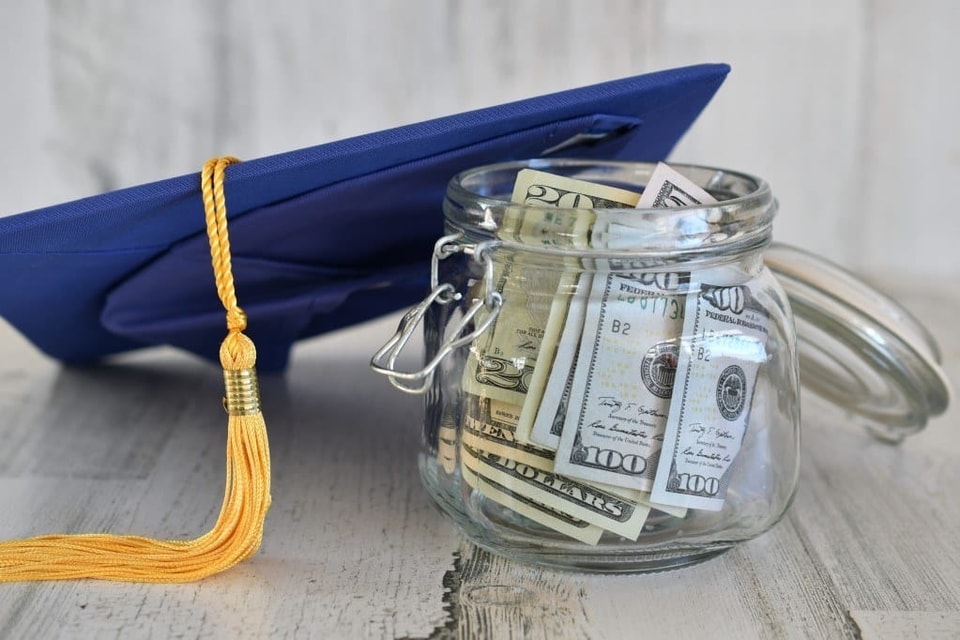

More from this series Repository of Third Way’s Higher Education Public Opinion Research
View seriesOver the past year, Democratic presidential candidates have released a wide swath of proposals for how to make college more affordable and provide relief to those with student debt. Some have gone so far as to say we should make college free for every single person in America and completely erase the educational loan debt of anyone who holds it.
While you may assume that the Democratic base is eager for this brand of sweeping change and is attracted to its universal application, a new nationwide poll of Democratic primary voters finds that this simply isn’t the case. In fact, this survey reveals that Democratic voters have a much greater appetite for candidates who center their higher education proposals on targeted policies that will improve students’ return on their higher ed investment and help those who need it the most over those angling to make college free for everyone and erase all debt. And primary voters don’t want to just talk about the costs of college alone—they also want to ensure that there are strong consumer protections in place to shield borrowers from low-performing and predatory schools that will leave them degreeless or unable to pay back their loans. In essence, Democratic primary voters understand that regardless of what students are paying, policymakers should be making sure that colleges provide real value to the students they serve.
The analysis that follows is based on an online, nationwide survey of 1,003 likely 2020 Democratic primary voters, with an oversample of 1,248 voters in four early states (Iowa, New Hampshire, Nevada, and South Carolina). This poll was conducted by Global Strategy Group for Third Way from November 1-9, 2019.
1. Targeted Reforms Outperform a Universal Approach.
It’s no surprise that in a Democratic primary, the candidates are all angling to appear more progressive than their rivals in the hopes of ginning up excitement from the hyper-engaged activist base. And in higher education, this “race to the left” has resulted in a number of candidates embracing plans that would make college free for every person in America and/or totally eliminate all existing student loan debt. Yet, our poll found that even Democratic primary voters squarely reject proposals that prioritize providing financial relief to all compared to ones that target relief to those who need it most. For example, when asked whether they would prefer to support a candidate who believes we should eliminate tuition and fees at public colleges and universities “for all income levels” or “for low- and middle-income students,” Democratic primary voters chose the targeted approach by 12 points (44% to 56% respectively). This preference for targeting investments was even more evident among primary voters in early states, who favored it by a margin of 2-to-1 (66% to 34%). This could indicate that the more voters hear about the policy options, the more they prefer a focused approach to a blanket bumper sticker.
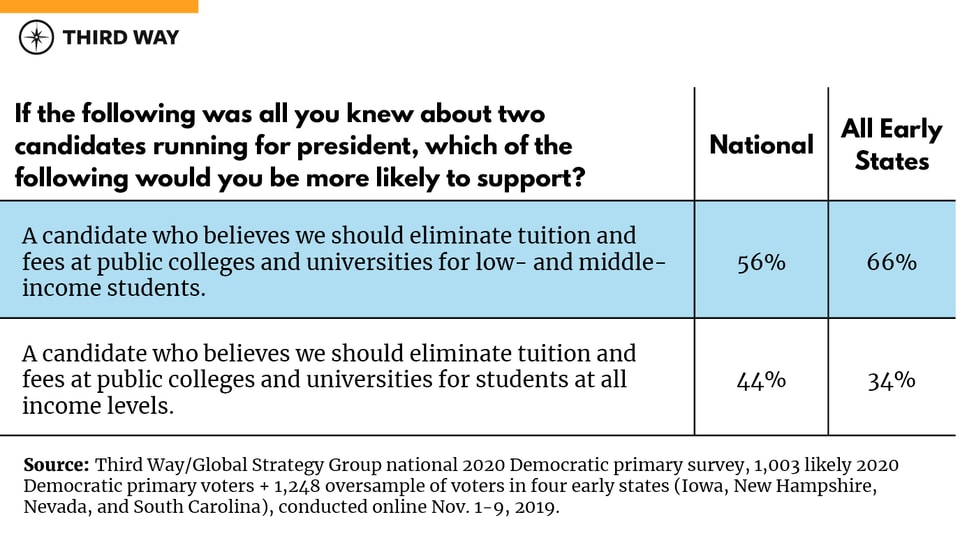
This desire to aim investments at those who really need them became even more pronounced when the topic shifted from free college to loan forgiveness. When Democratic primary voters were asked about a variety of policy options, their support trended downward for debt forgiveness more universal in scope. While 64% strongly supported canceling student loan debt for those who have been defrauded by predatory schools, that number fell by 19 points and dipped below 50% when it came to canceling all student loan debt. A more nuanced approach of canceling up to $10,000 in student loans per person scored in the middle. Interestingly, the policy that tied with canceling debts of defrauded borrowers in garnering the most support from Democratic primary voters was a targeted one to “increase investment in the Pell Grant program so that more low- and moderate-income students have the resources to enter and complete college.”
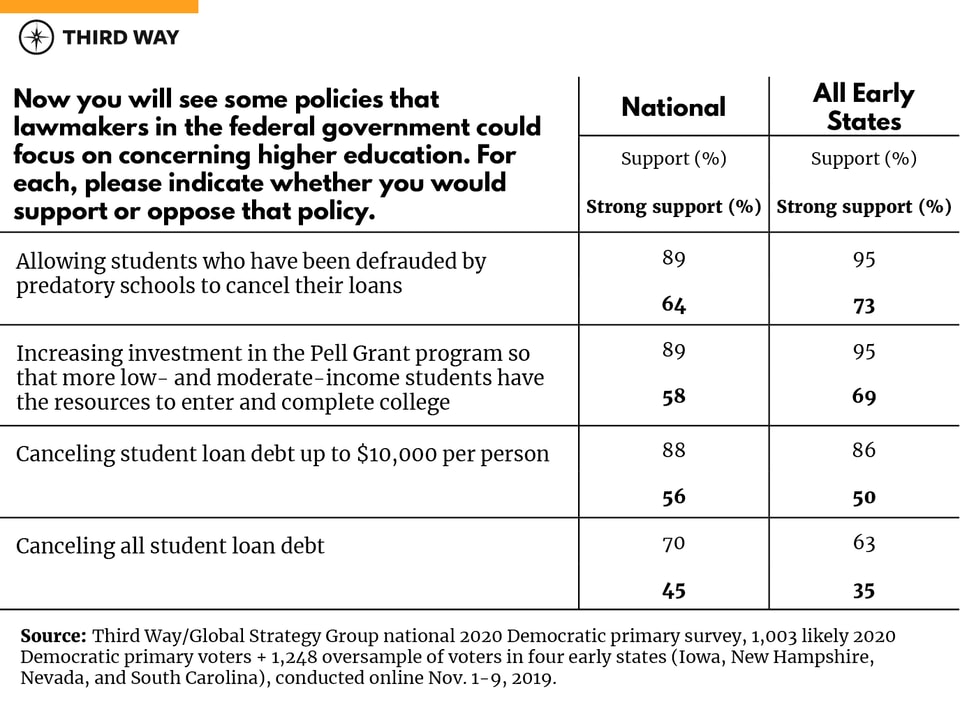
The upshot: Even in a Democratic primary, candidates should be cautious when it comes to offering universal and sweeping plans that may sound good on paper but are unrealistic, expensive (existing student loan debt currently sits around $1.6 trillion), and likely to be regressive in their impact. The students most likely to benefit from blanket free college and debt cancellation proposals are middle- and upper-income students who either don’t currently qualify for need-based federal financial aid or are likely to hold more expensive graduate degree debt. Instead, Democratic primary voters would much rather see an influx of new higher education money go toward students who need the economic mobility it could provide the most—including students who were left worse off by predatory institutions.
2. Democratic Voters Prioritize Making College Valuable over Making College Free.
It’s no secret that the 2020 election has incredibly high stakes for the country, and Democratic primary voters are committed to making sure Donald Trump is a one-term president. But in addition to their desire to win, there are also a number of policy priorities they’d like to see the next president champion. When asked which issues should be an important priority for a presidential candidate, 94% of primary voters and 98% of early state primary voters said “reducing healthcare costs.” But “making higher education affordable and ensuring it provides a good value to students” also clocked in as an important priority with 90% of primary voters nationally and 91% in early states. This left it virtually tied with the perennial issue of creating jobs and raising wages for workers (89% nationally; 93% in early states), and even ranked it above a crucial issue like strengthening gun laws (82% nationally; 89% in early states). Most notably, making sure college is affordable and providing a good value to students ranked significantly higher as a priority than “making higher education free,” which scored 20 points lower nationally and 31 points lower in early states. This is true despite the latter being the most discussed higher education issue in the Democratic primary. In fact, while primary voters support free college, the policy found itself at the bottom of the list of things on which Democratic primary voters would like to see the next president focus—measuring dead last on the list with early state voters, where only 26% thought it should be a top priority.
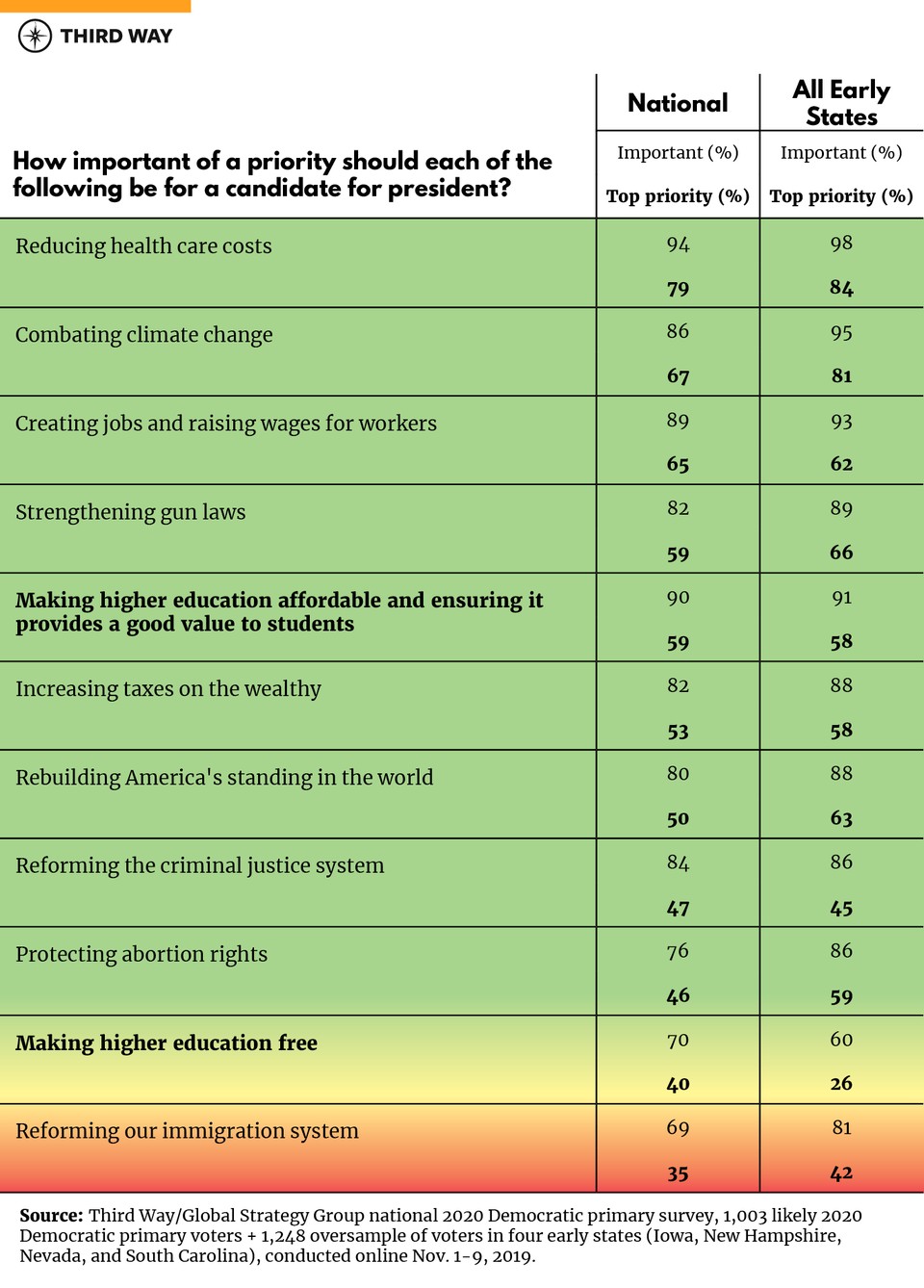
When asked to select between two candidates running for president where one “believes college should be affordable, high-quality, and give students the tools to get a good job,” and the other “believes college should be free for everyone who is accepted into an institution,” only 39% of Democratic primary voters nationally and 25% of early primary voters preferred the latter. Instead, 61% of primary voters and 75% of those in early states said they’d choose a candidate who believes college should be affordable, high-quality, and give students the tools to get a good job. And when asked directly to rank how important it is for presidential candidates to pursue a variety of policy proposals ranging from ensuring that any student that was accepted into a public institution of higher education would be able to graduate 1) “without paying any tuition or fees,” to 2) “without any debt” to 3) “without taking on massive debt,” more primary voters though the last was the most important priority (42%), compared to only 30% who gave the top spot to graduates being debt-free and 28% who thought they shouldn’t have to pay any tuition or fees. These numbers were all the more stark with early state primary voters, 6 in 10 of whom wanted candidates to prioritize ensuring students don’t have to take on massive debt—a whopping 37 points higher than the next closest option. This underscores a finding we’ve seen in previous polling across every subgroup: Americans aren’t looking for a free handout when it comes to getting a higher education. They believe that taking on some debt to attend college is okay, and Democratic primary voters feel the same way.
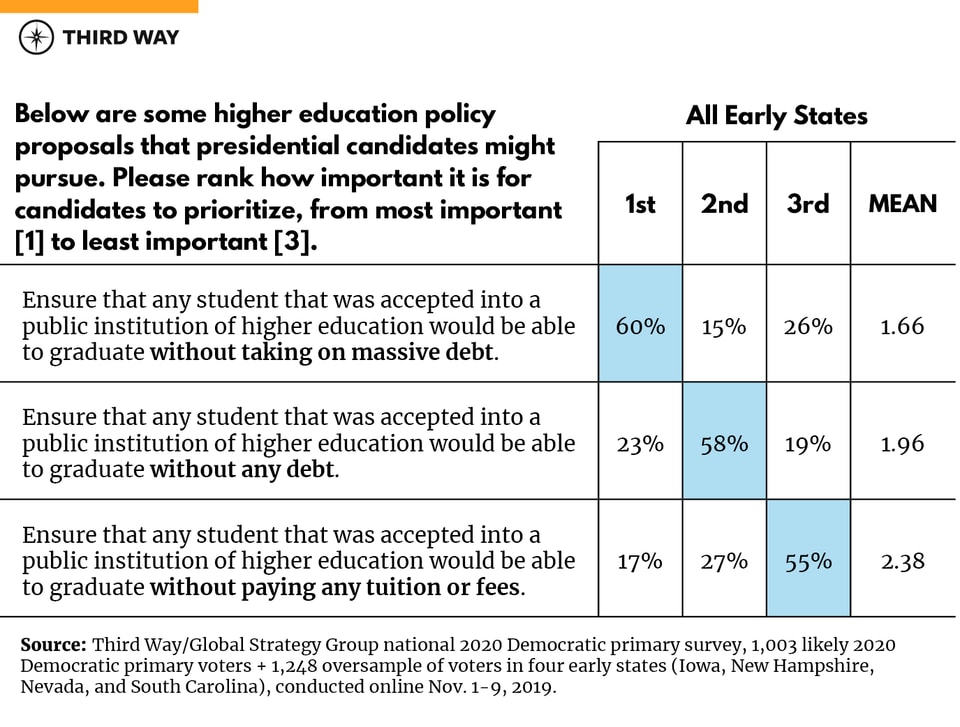
The upshot: As presidential candidates continue to build their case to the American people, they would be wise to heed the warning signs that making higher education free is much more popular on Twitter than it is even among primary voters. Instead, it’s clear that the voters who will decide the Democratic primary place much higher value on candidates who prioritize value themselves—believing that college doesn’t have to be free in order for it to work better for students and families.
3. Free College and Debt Forgiveness Don’t Fix Quality Problems.
One big reason why Democratic primary voters may believe candidates should be prioritizing issues beyond free college and debt forgiveness could be because they inherently understand that neither of these solutions would do anything to actually improve the quality control issues that persist in higher education today. Nearly nine in ten Democratic primary voters said that “colleges need to be held more accountable for providing a return on investment (ROI) to students,” with only 11% believing that colleges are holding up their end of that bargain. And primary voters feel strongly that the federal government has a clear responsibility to make sure colleges provide that ROI. In fact, clear majorities indicated that the federal government should enact guardrails that ensure students aren’t encouraged to take out loans or use grants at predatory institutions (76% nationally; 84% in early states), and that it should regulate all higher ed institutions to make sure they are providing a good return on investment (74% nationally; 71% in early states)—not just for-profit colleges.
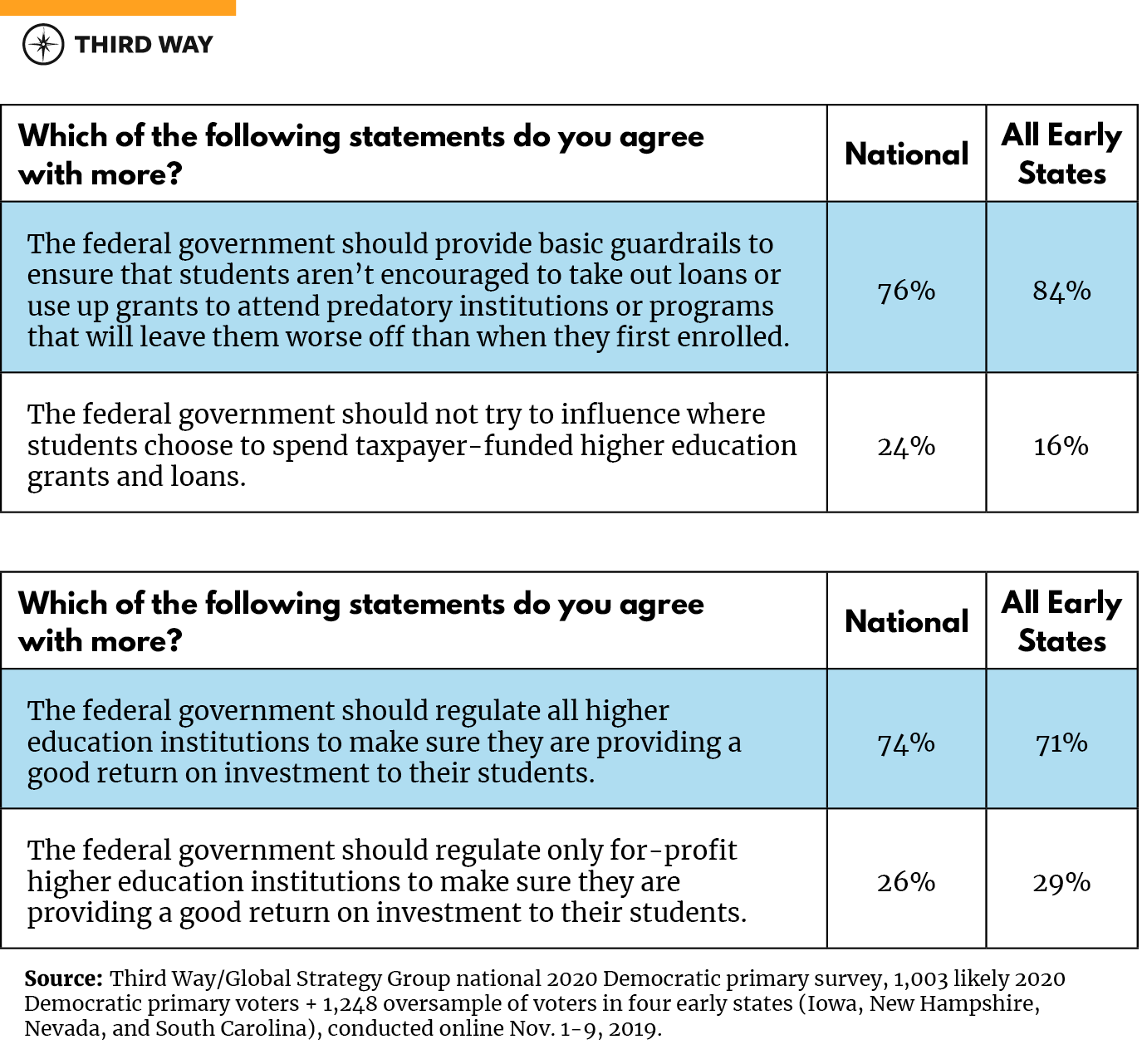
That’s one reason why when Democratic primary voters were provided with messages surrounding free college and debt forgiveness, they weren’t sold. On the contrary, three-quarters of Democratic primary voters indicated that it would be compelling (with 43% saying it would be extremely compelling) for a candidate to underscore the reality that “free college is a huge expense that does no good if we’re sending students to programs where only ten percent of them graduate.” Similarly, two-thirds of voters believed it would be compelling for a candidate to say that “forgiving student loans is a huge expense that does no good if we’re going to just keep sending students to poorly performing programs.” Instead of bumper sticker slogans, primary voters would like to see the next Democratic presidential candidate push for panoply of higher education policies that would strengthen federal oversight of colleges and universities, including requiring college accreditors to consider student outcomes to ensure all institutions are meeting basic levels of quality (83% support nationally; 88% in early states), increasing transparency to equip students and parents with the information to determine which school will set them up for a stable career with higher income (80% support nationally; 83% in early states), and cutting off federal aid to schools that spend less than a third of a student’s tuition on teaching and other instruction (71% support nationally; 77% in early states).
The upshot: While free college and debt forgiveness may sound good on a bumper sticker, the reality is that they do nothing to address the quality problems that Democratic primary voters are keenly aware exist in our higher education system. No amount of free tuition or debt forgiveness can give American families the quality assurance they need, so long as our higher education system continues to have middling graduation rates, predatory schools continue to prioritize profit over supporting students, and students continue to be left in the lurch by colleges that shut down even though they were accredited up until the day their doors closed. When it comes to ideas like debt forgiveness that attempt to repair damage that has been wrought by our inability to hold schools accountable, Democratic primary voters made clear that they want a candidate who is willing to reform the system to ensure that colleges leave students better off than when they enrolled.
Conclusion
As Democratic primary voters—and especially early state primary voters that will shape the race—head to the polls in less than three months, a number of issues will be top of mind as they select a candidate who will best represent their values and vision for the country in 2020 and beyond. When it comes to higher education, candidates should not assume that Democratic primary voters are looking for free handouts. While free college and debt forgiveness proposals may dominate the headlines, this data indicates that they are not the predominant policy remedies Democratic primary voters would like to see a presidential candidate prioritize. Instead, they want a candidate to focus more broadly on value. Even more, they want to make sure that new investments are targeted toward the students who need them most. Because at the end of the day, it’s critical that all students have the opportunity not just to make it to college, but also to graduate with high-valuable credentials or degrees that will allow them to get good jobs and pay back their student debt. That’s the goal for Democratic voters—as it should be for the rest of the country.
Methodology
Global Strategy Group conducted a national online survey of 1,003 likely Democratic primary voters, with oversamples of 312 each in Iowa, New Hampshire, Nevada, and South Carolina. The survey was conducted November 1 through 9, 2019. The precision of online surveys is measured using a credibility interval and, in this case, the interval is +/-3.1% nationally and +/-2.8% when the early states are analyzed in aggregate. The margin on the subsamples is larger. Care has been taken to ensure the geographic and demographic divisions of the expected electorates are properly represented based on historical turnout.
Full toplines of the survey can be found here.

